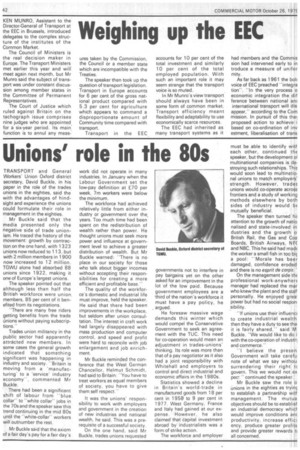Unions' role in the 80s
Page 44

If you've noticed an error in this article please click here to report it so we can fix it.
TRANSPORT and General Workers' Union Oxford district secretary, David Buckle, in his paper in the role of the trades. unions in the eighties, said the with the advantages of hindsight and experience the unions could formulate their role in management in the eighties.
Mr Buckle said that the media presented only the negative side of trade unionism. He traced the history of the movement: growth by contraction on the one hand, with 1323 unions now reduced to 113, but with 2 million members in 1 900 now increased to 12 million. TGWU alone had absorbed 88 unions since 1922, making it one of Europe's largest unions.
The speaker pointed out that although less than half the British workforce were union, members, 85 per cent of it benefited from its negotiations.
"There are many free riders getting benefits from the trade Unions without paying subscriptions."
Trades union militancy in the public sector had apparently attracted new members. In some cases the general growth indicated that something significant was happening in industry and society. "Britain is moving from a 'manufacturing' to a 'service' industry economy", commented Mr Buckle.
There had been a significant shift of labour from "blue collar" to "white collar" jobs in the 70s and the speaker saw this trend continuing in the mid 80s until the "white-collar" workers will outnumber the rest.
Mr Buckle said that the axiom of a fair day's pay for a fair day's work did not operate in many industries. In January when the Labour Government set the low-pay definition at £70 per week, 7m workers were below the minimum.
The workforce had achieved relatively little from either industry or government over the. years. Too much time had been spent on the redistribution of wealth rather than power. He thought unions must seek more power and influence at government level to achieve a greater distribution of wealth. But Mr Buckle warned: "There is no • place in our society for those who talk about bigger incomes without accepting their responsibilities for creating a more efficient and profitable base."
The quality of the workforce's domestic and industrial life must improve, held the speaker. He said that there had been improvements in the workplace, but seldom after union consultation. The interest in craft work had largely disappeared with mass production and computer control, and speed and profit were hard to reconcile with job enlargement and job en-richment.
Mr Buckle reminded the conference that the West German Chancellor, Helmut Schmidt, had said to Britain: "You have to treat workers as equal members of society, you have to give them self respect."
It was the unions' responsibility to work with employers and government in the creation of new industries and national wealth, he said. This was a prerequisite of a successful society.
On the one hand, said Mr Buckle, trades unions requested governments not to interfere in pay bargains yet on the other asked for an improvement in the lot of the low paid. Because government employees are a 'third of the nation's workforce it must have a pay policy, he argued.
He foresaw massive wage demands this winter which would compel the Conservative Government to seek an agreement with the TUC. This need for co-operation would mean an adjustment in trades-unions' thinking. Its role was more than that of a pay negotiator as it also had a joint responsibility with Whitehall and employers to control and direct industrial and economic affairs in the 1980s.
Statistics showed a decline in Britain's world-trade in manufactured goods from 18 per cent in 1958 to 9 per cent in 1977. West Germany, France and Italy had gained at our expense. However, he also claimed that capital investment abroad by industrialists was a form of strike action.
The workforce and employer must be able to identify witt each other, continued thE speaker, but the development ol multinational companies is destroying such relationships. This would soon lead to multinational unions to match employers' strength. However, trades unions would co-operate across frontiers and a study of working methods elsewhere by both sides of industry would bE mutually beneficial.
The speaker then turned hi: attention to the growth of natio nalised and state-involved in dustries and the growth o British Rail, the Gas and Coa Boards, British Airways, NF( and NBC. This he said had mad( the worker a small fish in too bif a pool: "Morale has beer damaged, confidence eroded and there is no esprit de corps.'
On the management side thE professional work-anywherE manager had replaced the mar who knew the plant and the staf personally. He enjoyed grea: power but had no social respon• sibility.
"If unions use their influencE to create industrial wealth then they have a duty to see tha it is fairly shared," said M Buckle. "We would like to do i with the co-operation of industr) and commerce."
"I believe the presen Government will take carefu note of what we say withou surrendering their right tt govern. This we would not ex pect "continued the speaker.
Mr Buckle saw the role o unions in the eighties as tryinc to establish a partnership with management. The mutua objectives should be to establish an industrial democracy which would improve conditions an( productivity, increase effici ency, produce greater profits and provide greater rewards ti all concerned.
























































































































